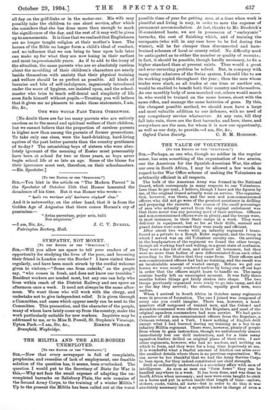[To THE EDITOR OF THE " SPECTATOR-1
Sin,—Now that every newspaper is full of complaints, prophecies, and remedies of lack of employment, one feasible solution of the question has, it seems, been overlooked. The question I would put to the Secretary of State for War is this,—Why not face the small expense of adapting the un- completed barracks on Salisbury Plain, the sole remains of the Second Army Corps, to the training of a winter Militia ? Up to the present the Militia has been called out at the worst
possible time of year for getting men, at a time when work is plentiful and living is easy, in order to save the expense of permanent accommodation. At last, thanks to Mr. Brodrick's ill-considered haste, we are in possession of "embryonic" barracks, the cost of finishing which, and of training the occupants (who will in any case have to be fed during the winter), will be far cheaper than disconnected and hare- brained schemes of local or county relief. No difficulty need be anticipated as to either the number or quality of recruits ; in fact, it should be possible, though hardly necessary, to fix a higher standard than at present exists. Thus would a great and ever-recurring problem be solved. But, in company with many other admirers of the Swiss system, I should like to see its working copied throughout the year ; then the men whose trades were slack, as all trades at one time or another are, would be enabled to benefit both their country and themselves. As one monthly body of men marched out, others would march in, who would be trained on the same horses, shoot with the same rifles, and manage the same batteries of guns. By this, the cheapest possible method, we should soon have a large and most valuable addition to our defences, with no need of any compulsory service whatsoever. At any rate, till they fall into ruin, there are the first barracks, and here, there, and everywhere are the men, for whom it is now our opportunity, as well as our duty, to provide.—I am, Sir, &c., Oxford Union Society. C. B. M. HODGSON.
THE VALUE OF VOLUNTEERS.


















































 Previous page
Previous page